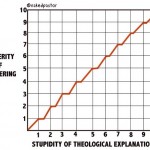Working on an article about monotheism in early Christianity, I was struck as I hadn’t been before by the contrast between two statements in the Gospel of Mark, one on the lips of others who are complaining about Jesus, the other on the lips of Jesus complaining about how someone else has characterized him.
Mark 2:7: “Why does this fellow speak in this way? It is blasphemy! Who can forgive sins but God alone?”
Mark 10:18: Jesus said to him, “Why do you call me good? No one is good but God alone.”
Both use the same Greek phrase εἰ μὴ εἷς ὁ θεός. Richard Bauckham writes (in “Markan Christology According to Richard Hays: Some Addenda,” Journal of Theological Interpretation 11:1 (2017) 21–36, here p.28):
The phrase “but God alone” (εί μή εις ة θεός) is identical in 2:7 and 10:18. It alludes to the Shema in the form in which it was often summarized in Second Temple period Jewish literature: “God is one” (είς θεός έστιν)٠
This is really striking given that both of these texts are quite crucial to how we understand the Christology of the Gospel of Mark as a whole.
The first one sees Jesus respond with a healing that is intended to demonstrate that God has given the son of man authority to forgive sins.
Perhaps the point made through the similar language is that inherent goodness is a different matter. God has delegated some authority to human beings in general (or perhaps, if one thinks Son of Man is a messianic title here, to his anointed one). Goodness, on the other hand, is not something that can be bestowed the way authority can. Human beings fall short, and one of Jesus’ main aims was to call his people to repentance, a people persuaded of their own inherent goodness as the people of God. Jesus thus takes aim at the fact that “good” had become a form of respectful address, not always reflected in reality.
One of the only places I’ve seen this connection made a focus of attention is in John J. R. Lee’s article “The divinity of Jesus and the uniqueness of God: are they compatible? A reflection on high Christology and monotheism in Mark’s Gospel” in Midwestern Journal of Theology 15:1 (2016) 84-100. He uses Bauckham’s concept of “divine identity” which I have evaluated critically in the past and find unhelpful. I’ll include some links to those posts below.
What do readers of this blog think? I’m among those who are not persuaded by attempts to read ideas like pre-existence and ontological divinity into the Gospel of Mark. Does the similar phrases in these two passages fit, confirm, or challenge that conclusion I had drawn previously? What do you think and why?
Of related interest:
https://ehrmanblog.org/nope-jesus-is-not-yahweh/?utm_source=feedly&utm_medium=rss&utm_campaign=nope-jesus-is-not-yahweh
https://ehrmanblog.org/a-heresy-that-may-not-sound-heretical-to-you-arius-of-alexandria/?utm_source=feedly&utm_medium=rss&utm_campaign=a-heresy-that-may-not-sound-heretical-to-you-arius-of-alexandria
https://ehrmanblog.org/the-actual-heretical-views-of-arius-in-his-own-words/
Mike Bird provides a teaser for other subscription-only posts with “Is Jesus Merely an Angel?” But his review of George Hunsinger’s commentary on Philippians is free for all readers.
Open access book on the Apostle Peter and his reception
Jim Davila drew attention to a new book on pre-existence in ancient Judaism and Christianity, another on how angels are represented, and yet another on the Gospel of Matthew in its theological and historical context.
How can Jesus promise eternal life?
Ken Schenck on the mission of Jesus
3D imaging of the Church of the Holy Sepulcher
Bob Cornwall, “First Things First”
Here are those prior blog posts about divine identity, as promised:
See also:
A Man Attested By God: Daniel Kirk on the Human Jesus of the Synoptic Gospels













